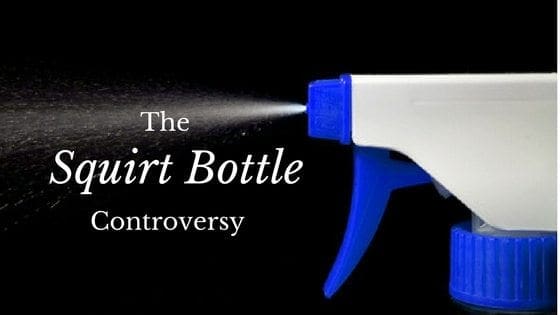
Listen to the audio version of this article
It looks innocent enough. It’s a little plastic squirt bottle sitting on the kitchen counter. In that plastic bottle is plain tap water. That little plastic bottle, as innocent as it looks, has become the tool that is destroying the bond you share with your cat. The reason? You’re using the squirt bottle to deter your cat from engaging in any number of behavior you deem inappropriate or unwanted.
It’s an Ineffective Tool for Training Your Cat
The squirt bottle deterrent, in many cat households, has become the popular method for keeping cats off counters and tables. It is also the way many people attempt to stop their cats from scratching the furniture. The squirt bottle is used to stop a cat who is getting too aggressive, either with another companion animal or with a human family member. The squirt bottle has become the tool many cat parents reach for immediately when the cat isn’t acting the way we want him to act.
You’d think that based on the popularity of the squirt bottle technique, it must be an extremely effective and successful method of training cats. The truth is though, it’s not effective at training a cat to cease engaging in unwanted behaviors. The squirt bottle technique only accomplishes three things:
- It creates frustration in the cat
- It causes the cat to become afraid of you
- The cat learns to wait until you aren’t around before engaging in the behavior
Punishment Doesn’t Work When Training Animals
When you punish a cat for exhibiting a behavior you don’t like, it doesn’t stop the behavior. First, it’s important to understand that regardless of how unwanted the behavior is, it serves a purpose for the cat. Your cat isn’t scratching on the sofa or jumping on the counter just to make you mad. Animals engage in behaviors that serve a function (i.e. a pay-off). Additionally, many of the behaviors cat parents view as unwanted, such as furniture scratching, are normal, natural behaviors. When you squirt the cat with water for scratching the furniture you may momentarily stop the behavior but the cat has a normal and natural need to scratch. If he gets punished every time he attempts to engage in a normal behavior, he will probably become afraid of you and he’ll also continue the behavior in secret. That’s a very stressful combination.
So instead of trying to train a cat by punishing him for engaging in normal behaviors, let’s try a better idea.
Think Like a Cat
Identify why the cat exhibits a particular behavior so you can provide a better option. If your cat is scratching the furniture then it probably means you either don’t have a scratching post or it’s the wrong kind. If your cat is getting aggressive with another companion animal, then it’s time to do some behavior work to help them develop a positive association with each other. Squirting the cat with water when he’s reacting to another cat will do nothing to help them ever form a peaceful relationship.
When training your cat, one of the most important tools is trust. Your cat needs to be able to trust you in order to form that important bond. The last thing you want is for your cat to run from you out of fear. So it’s time to put that squirt bottle away and use a more humane and productive training method. Think like a cat and look at your environment from your cat’s point of view and you’ll be surprised at how much more effective your training techniques will become.
Need More Information?
For more information on cat behavior and training, refer to the best-selling books by Pam Johnson-Bennett. Pam’s books are available at bookstores and online. We’ve included links to Amazon here on our website.
If you have a question about your cat’s behavior or health, contact your veterinarian. This article is not intended as a medical diagnosis nor is it a replacement for your cat’s regular veterinary care. This article is for general information purposes only.




